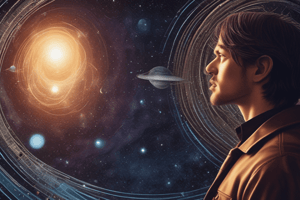Podcast
Questions and Answers
Why does entropy tend to increase over time?
Why does entropy tend to increase over time?
- It is a statistical phenomenon. (correct)
- Time elapses differently in strong gravitational fields.
- Fundamental laws draw a distinction between order and disorder.
- Order has been building up since the Big Bang.
How is the increase in order in the universe explained?
How is the increase in order in the universe explained?
- Through the concept of time travel and wormholes.
- Through the emergence of space and time as fundamental quantities.
- By observing that time elapses differently in strong gravitational fields.
- With each step in the evolutionary lineage leading to greater order. (correct)
What is mentioned as a possibility for the nature of space and time in the text?
What is mentioned as a possibility for the nature of space and time in the text?
- They may be emergent quantities. (correct)
- They do not play a role in understanding physical laws.
- They are fundamental quantities.
- They may prevent time travel from being possible.
Why does the speaker express uncertainty about the possibility of time travel?
Why does the speaker express uncertainty about the possibility of time travel?
What does the speaker emphasize as unique and irretrievable?
What does the speaker emphasize as unique and irretrievable?
What did Albert Einstein demonstrate about time?
What did Albert Einstein demonstrate about time?
What does Einstein's theory of relativity suggest about time and motion?
What does Einstein's theory of relativity suggest about time and motion?
What is the significance of the arrow of time according to the text?
What is the significance of the arrow of time according to the text?
How does the concept of time relate to the laws of physics and the universe's evolution?
How does the concept of time relate to the laws of physics and the universe's evolution?
How does an object's speed approaching the speed of light affect time according to the text?
How does an object's speed approaching the speed of light affect time according to the text?
Flashcards are hidden until you start studying
Study Notes
- Brian Greene is explaining the nature of time and its connection to space.
- Time and space are related, but individuals can move freely in space but not in time.
- Albert Einstein showed that traveling in a fast-moving spaceship results in the clock on the spaceship ticking slower than clocks on Earth, allowing individuals to travel to the future.
- The speed of light is the theoretical limit for how fast anything can move.
- Time has an arrow pointing from the past to the future; it is not fully understood why.
- Before life existed on Earth, the universe and things within it still underwent changes.
- Time is a human-made concept used to measure the changes in the universe.
- Einstein's theory of relativity shows that clocks on objects in motion tick slower than stationary clocks.
- The ratio of time on a stationary clock to time on a moving clock is determined by the length of the paths of light.
- As an object's speed approaches the speed of light, the difference in time between the two clocks becomes increasingly significant.
- The concept of time is essential for understanding the evolution of the universe and the laws of physics.
- The universe is expanding, and all physical laws continue to operate in a curved space-time.- The speaker discusses the question of why time appears to move from past to future despite the fundamental equations of physics not distinguishing between past and future.
- The concept of entropy and the second law of thermodynamics are mentioned, with the observation that entropy tends to increase over time.
- The speaker notes that this increase in entropy is a statistical phenomenon, and that it is more likely for certain events (such as eggs splattering or glasses smashing) to occur than their reversals.
- The discussion then turns to the idea that order and disorder have little meaning for a single particle, as the fundamental laws do not draw a distinction between the two.
- The speaker then raises the question of how order arises in the universe, given that everything tends towards disorder.
- The answer given is that order has been building up since the Big Bang, with each step in the evolutionary lineage leading to greater and greater order.
- The speaker also mentions Einstein's work on time and relativity, including the observation that time elapses differently in strong gravitational fields.
- The idea of time travel and wormholes as time machines is brought up, with the discussion centering on the philosophical and logical paradoxes that arise from the concept.
- The speaker expresses uncertainty as to whether time travel is possible or not, suggesting that a full understanding of the physical laws may prevent it.
- The speaker also mentions the idea that space and time may be emergent quantities rather than fundamental, but expresses uncertainty as to the concrete model that would make this idea fully understandable.
- The discussion ends with the speaker expressing the importance of understanding the nature of time and the universe, and the idea that every moment in time is unique and irretrievable.
Studying That Suits You
Use AI to generate personalized quizzes and flashcards to suit your learning preferences.




